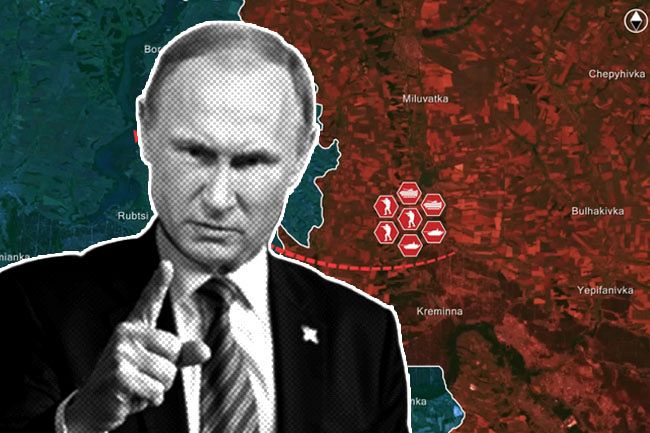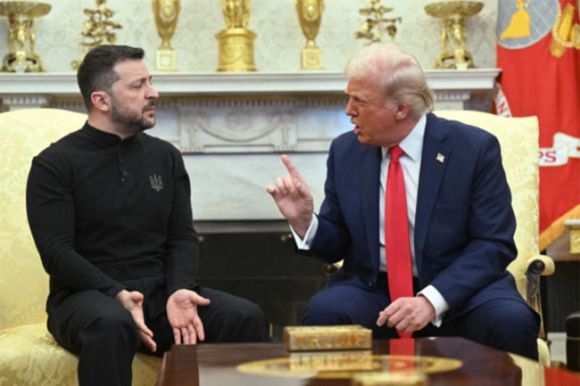Amid calls for peace and an end to the war between Russia and Ukraine, Vladimir Putin is stepping up his offensive campaign and expanding his military might, writes Patrick Drennan.
ON 26 MARCH 2025, Ukrainian President Volodymyr Zelenskyy told French news outlet Le Figaro that Russian President Vladimir Putin is attempting to delay ongoing peace negotiations to buy time for an offensive against Sumy and Kharkiv Oblasts in Spring 2025. Zelenskyy noted that Russian forces wanted to conduct these offensive operations in 2024, but the Ukrainian incursion into Kursk Oblast in August 2024 spoiled this plan.
Zelensky warned that Russian forces are preparing for intensified ground operations in Sumy, Kharkiv and Zaporizhia oblasts, although Ukrainian officials have expressed doubts about Russian forces' ability to conduct successful offensive operations in these areas, particularly against Sumy City. Sumy City had a population of 256,000 in 2022 and is roughly 30 kilometres from the frontline.
Nevertheless, Putin recently told Russian Chief of the General Staff Army General Valery Gerasimov to “think in the future about creating a security zone” along the Ukrainian-Russian international border, including in Sumy Oblast.
Russian forces have been conducting intensified ground assaults within northern Sumy Oblast since early March 2025 as part of their effort to push Ukrainian forces from remaining positions in Kursk Oblast. Ukrainian Commander-in-Chief General Oleksandr Syrskyi visited Ukrainian forces in Sumy on March 27 and reported that Russian attacks have intensified.
Russian forces remain unlikely to conduct a successful offensive operation to seize Sumy City but would likely leverage future offensive operations in this and other oblasts that Russian forces do not currently occupy to demand that Ukraine cede additional territory to Russia, particularly amid discussions of a potential future peace in Ukraine.
However, all ground offensives in early spring will be difficult for both sides, as the thaw makes the rivers flow high and the muddy season (Rasputitsa) arrives. Russia’s immediate goal is to claim all of the Donetsk Oblast before any proposed ceasefire. Consequently, intense to-and-fro battles are currently raging in Pokrovsk City in Donetsk. On the other hand, the Ukrainians have seized a sliver of Russian territory in Belgorod Oblast as a counter bargaining chip.
Meanwhile, Russia is expanding its military base with new weapons and recruits.
Ukraine's Main Military Intelligence Directorate (GUR) Deputy Head, Major General Vadym Skibitskyi, told Ukrainian state news outlet Pravda on 25 March that Russia is producing high numbers of Kh-101 and Kaliber cruise missiles and Iskander ballistic missiles to replenish its stockpiles and augment their strike packages with more accurate missiles with higher payloads. Skitbitskyi reported that Russia is also producing Kinzhal ballistic missiles and Zirkon hypersonic missiles.
According to the Institute for the Study of War (ISW):
Ukrainian outlet Suspilne reported on 13 March that the Ukrainian public organisation Independent Anti-Corruption Commission (NAKO) stated that Russia is increasing its production of guided glide bombs with at least 26 factories in Russia involved in the production of glide bomb components.
NAKO noted that Russia recently improved the bombs' “Comet” navigation system, which Russia also installs on drones and missiles. NAKO senior researcher Viktoria Vyshnivska stated that Russia increased the number of antennas in the “Comet” navigation system from eight to 12 to decrease the chances of Ukrainian forces interfering with the projectiles.
Vyshnivska noted that it is impossible to completely isolate Russia with sanctions as NAKO reported that Russia uses hundreds of shell and offshore companies to purchase significant amounts of microelectronics for glide bombs.
Russia also increased its mobilisation efforts in Moscow and across Serbia.
Russian opposition outlet Vertska reported on 13 March that a source in Moscow Mayor Sergei Sobyanin's office stated that Moscow City is continuing to recruit volunteer servicemembers (dobrovoltsi) to fight in Ukraine. A source told Verstka that there are no signs that Russia is even close to winding down its military recruitment efforts and another source in a military registration and enlistment office in Siberia cited the threat of a future war with NATO as one justification to continue recruitment efforts.
Russia keeps altering its demands for a peace agreement.
ISW said, ‘Putin reiterated his demand for the elimination of the “root causes” of the war in Ukraine [the expansion of NATO] as a precondition for a peace agreement’, a claim that has little real substance. In reality, Ukraine has little chance of becoming a member of NATO within the next ten years.
On 26 March, the Kremlin said it will not implement the agreed ceasefire in the Black Sea until the United States lifts sanctions on Russian state-owned agricultural bank Rosselkhozbank and other unspecified financial organisations involved in international food and fertiliser trade. U.S. Secretary of State Marco Rubio acknowledged on the same day that the European Union (EU) should be involved in lifting these sanctions on Russia.
ISW reported:
‘Putin claimed that “neo-Nazi formations” are ruling Ukraine in the absence of a legitimate Ukrainian government and questioned how Russia can negotiate with these groups. Putin has previously characterised the Ukrainian Government as illegitimate in an effort to justify Russia's [invasion].’
Putin then doubled-down by proposing that the ‘United Nations (UN), the United States and European countries install a temporary administration in Ukraine’. He ultimately wants the ‘removal of the Ukrainian government and the installation of a pro-Russian puppet regime’.
On 30 March, American President Donald Trump said he was “pissed off” at this stance and threatened sanctions on those who trade oil with Russia. These major traders are China, India and Türkiye. However, it is unlikely Trump will sanction these countries any further, nor that Russia will stop supplying them, overtly or covertly.
Russia will make delaying and deceptive moves to the America-led peace process for most of 2025. Its economy is now war-based. Any attempt to quickly reverse that will have severe political and economic consequences for the Putin regime.
Patrick Drennan is a journalist based in New Zealand, with a degree in American history and economics.
 This work is licensed under a Creative Commons Attribution-NonCommercial-NoDerivs 3.0 Australia License
This work is licensed under a Creative Commons Attribution-NonCommercial-NoDerivs 3.0 Australia License
Support independent journalism Subscribe to IA.

Related Articles
- Russia sends donkeys to the frontline
- Siberia's mineral wealth: Russia has it — China wants it
- JOHN PILGER: War in Europe and the rise of raw propaganda
- Abbott's wars













